University Study: Privatization of British Rail & Social Welfare
VerifiedAdded on 2022/11/28
|60
|15798
|162
Project
AI Summary
This project presents a comprehensive analysis of the privatization of British Rail, focusing on its implications for social welfare within the UK. The study is structured into five chapters, beginning with an introduction that outlines the research aim, objectives, questions, and the rationale for investigating the privatization's impact on passenger welfare and railway operations. A thorough literature review examines the concepts of privatization and welfare states, exploring factors influencing privatization and its effects on both organizations and the public. The research methodology employs a positivism philosophy, descriptive design, and a deductive approach, with primary data collected through interviews with British Rail employees. The findings reveal that social welfare was a key driver of privatization, and that post-privatization changes improved service quality. The conclusion summarizes the study's key findings, links them to the research objectives, offers recommendations, and considers the implications for theory and practice, as well as limitations and directions for future research. The project underscores the complex interplay between privatization, social welfare, and the evolution of the British railway system.
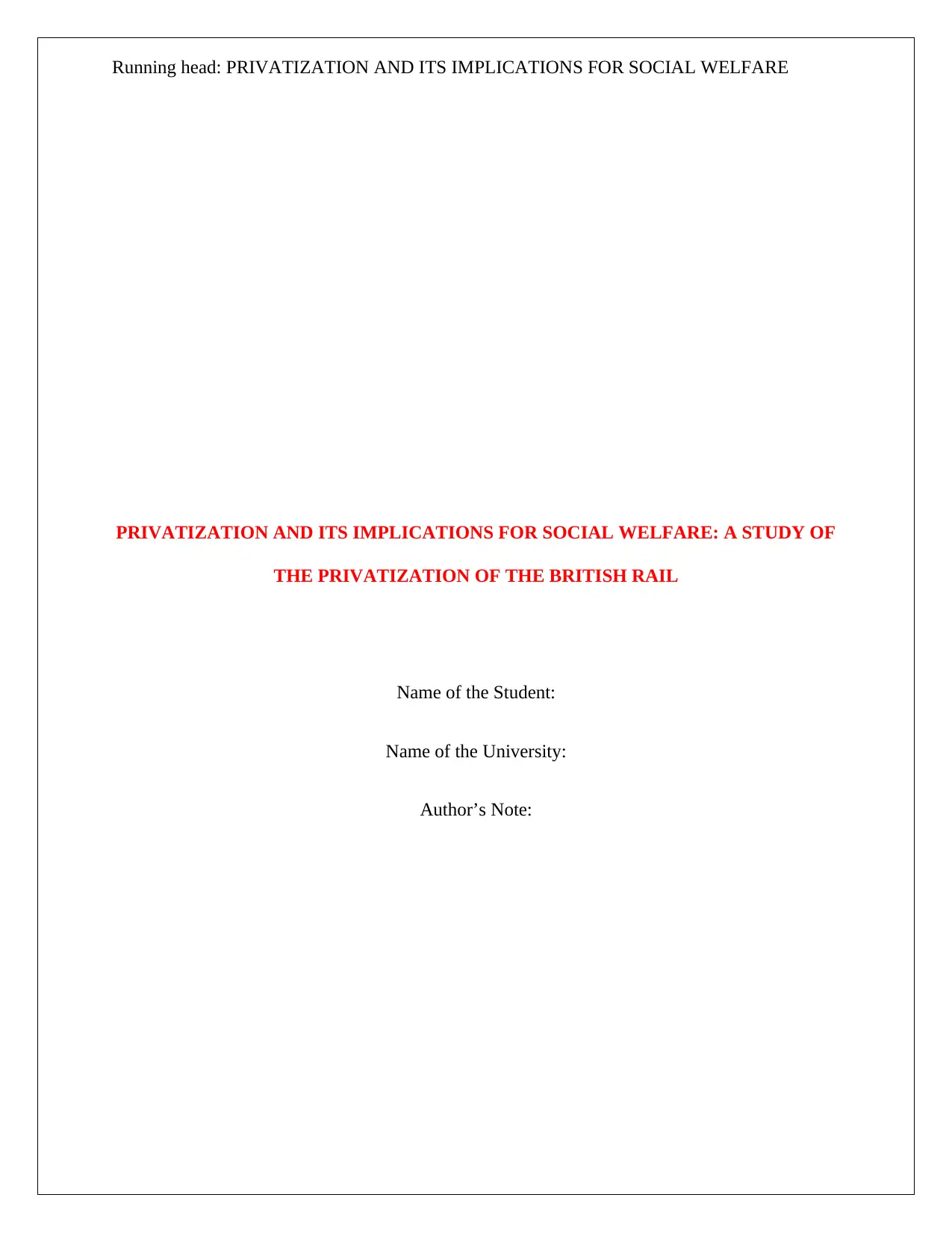
Running head: PRIVATIZATION AND ITS IMPLICATIONS FOR SOCIAL WELFARE
PRIVATIZATION AND ITS IMPLICATIONS FOR SOCIAL WELFARE: A STUDY OF
THE PRIVATIZATION OF THE BRITISH RAIL
Name of the Student:
Name of the University:
Author’s Note:
PRIVATIZATION AND ITS IMPLICATIONS FOR SOCIAL WELFARE: A STUDY OF
THE PRIVATIZATION OF THE BRITISH RAIL
Name of the Student:
Name of the University:
Author’s Note:
Paraphrase This Document
Need a fresh take? Get an instant paraphrase of this document with our AI Paraphraser
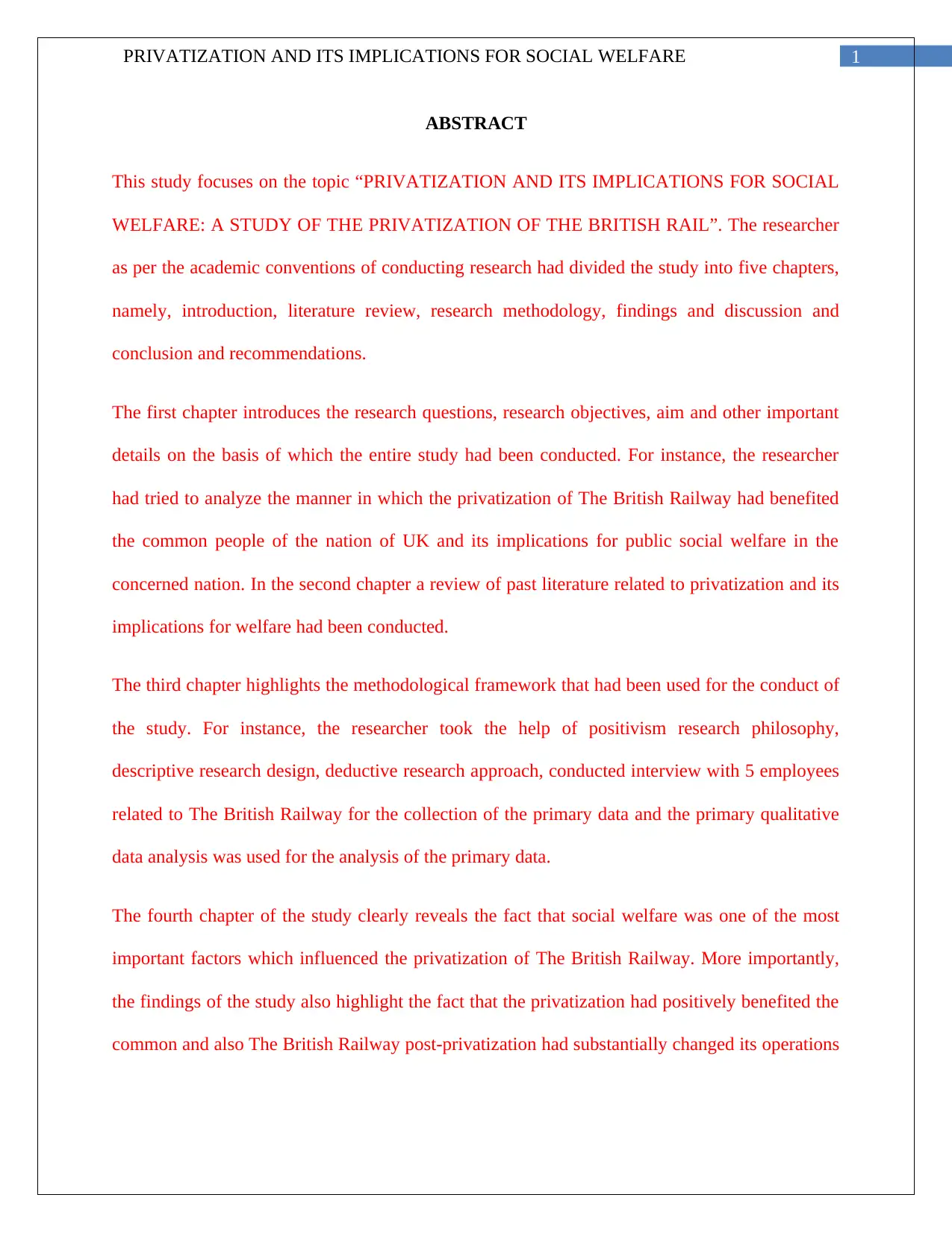
1PRIVATIZATION AND ITS IMPLICATIONS FOR SOCIAL WELFARE
ABSTRACT
This study focuses on the topic “PRIVATIZATION AND ITS IMPLICATIONS FOR SOCIAL
WELFARE: A STUDY OF THE PRIVATIZATION OF THE BRITISH RAIL”. The researcher
as per the academic conventions of conducting research had divided the study into five chapters,
namely, introduction, literature review, research methodology, findings and discussion and
conclusion and recommendations.
The first chapter introduces the research questions, research objectives, aim and other important
details on the basis of which the entire study had been conducted. For instance, the researcher
had tried to analyze the manner in which the privatization of The British Railway had benefited
the common people of the nation of UK and its implications for public social welfare in the
concerned nation. In the second chapter a review of past literature related to privatization and its
implications for welfare had been conducted.
The third chapter highlights the methodological framework that had been used for the conduct of
the study. For instance, the researcher took the help of positivism research philosophy,
descriptive research design, deductive research approach, conducted interview with 5 employees
related to The British Railway for the collection of the primary data and the primary qualitative
data analysis was used for the analysis of the primary data.
The fourth chapter of the study clearly reveals the fact that social welfare was one of the most
important factors which influenced the privatization of The British Railway. More importantly,
the findings of the study also highlight the fact that the privatization had positively benefited the
common and also The British Railway post-privatization had substantially changed its operations
ABSTRACT
This study focuses on the topic “PRIVATIZATION AND ITS IMPLICATIONS FOR SOCIAL
WELFARE: A STUDY OF THE PRIVATIZATION OF THE BRITISH RAIL”. The researcher
as per the academic conventions of conducting research had divided the study into five chapters,
namely, introduction, literature review, research methodology, findings and discussion and
conclusion and recommendations.
The first chapter introduces the research questions, research objectives, aim and other important
details on the basis of which the entire study had been conducted. For instance, the researcher
had tried to analyze the manner in which the privatization of The British Railway had benefited
the common people of the nation of UK and its implications for public social welfare in the
concerned nation. In the second chapter a review of past literature related to privatization and its
implications for welfare had been conducted.
The third chapter highlights the methodological framework that had been used for the conduct of
the study. For instance, the researcher took the help of positivism research philosophy,
descriptive research design, deductive research approach, conducted interview with 5 employees
related to The British Railway for the collection of the primary data and the primary qualitative
data analysis was used for the analysis of the primary data.
The fourth chapter of the study clearly reveals the fact that social welfare was one of the most
important factors which influenced the privatization of The British Railway. More importantly,
the findings of the study also highlight the fact that the privatization had positively benefited the
common and also The British Railway post-privatization had substantially changed its operations

2PRIVATIZATION AND ITS IMPLICATIONS FOR SOCIAL WELFARE
processes to improve the quality of the transport services offered by it. The final chapter
summarizes the major findings of the study.
processes to improve the quality of the transport services offered by it. The final chapter
summarizes the major findings of the study.
⊘ This is a preview!⊘
Do you want full access?
Subscribe today to unlock all pages.

Trusted by 1+ million students worldwide

3PRIVATIZATION AND ITS IMPLICATIONS FOR SOCIAL WELFARE
ACKNOWLEDGEMENT
I would like to take this opportunity to thank my Professor Mr. ………….., for offering me the
opportunity to complete my dissertation on the topic “PRIVATIZATION AND ITS
IMPLICATIONS FOR SOCIAL WELFARE: A STUDY OF THE PRIVATIZATION OF THE
BRITISH RAIL”. I would also like to thank my Supervisor for the constant support which he
offered me during the completion of this study.
Lastly, I would also like to thank my friends and family members whose constant support and
help enabled me to complete this dissertation.
Thank You.
-----------------------------------------------------
(Name of the Researcher)
ACKNOWLEDGEMENT
I would like to take this opportunity to thank my Professor Mr. ………….., for offering me the
opportunity to complete my dissertation on the topic “PRIVATIZATION AND ITS
IMPLICATIONS FOR SOCIAL WELFARE: A STUDY OF THE PRIVATIZATION OF THE
BRITISH RAIL”. I would also like to thank my Supervisor for the constant support which he
offered me during the completion of this study.
Lastly, I would also like to thank my friends and family members whose constant support and
help enabled me to complete this dissertation.
Thank You.
-----------------------------------------------------
(Name of the Researcher)
Paraphrase This Document
Need a fresh take? Get an instant paraphrase of this document with our AI Paraphraser
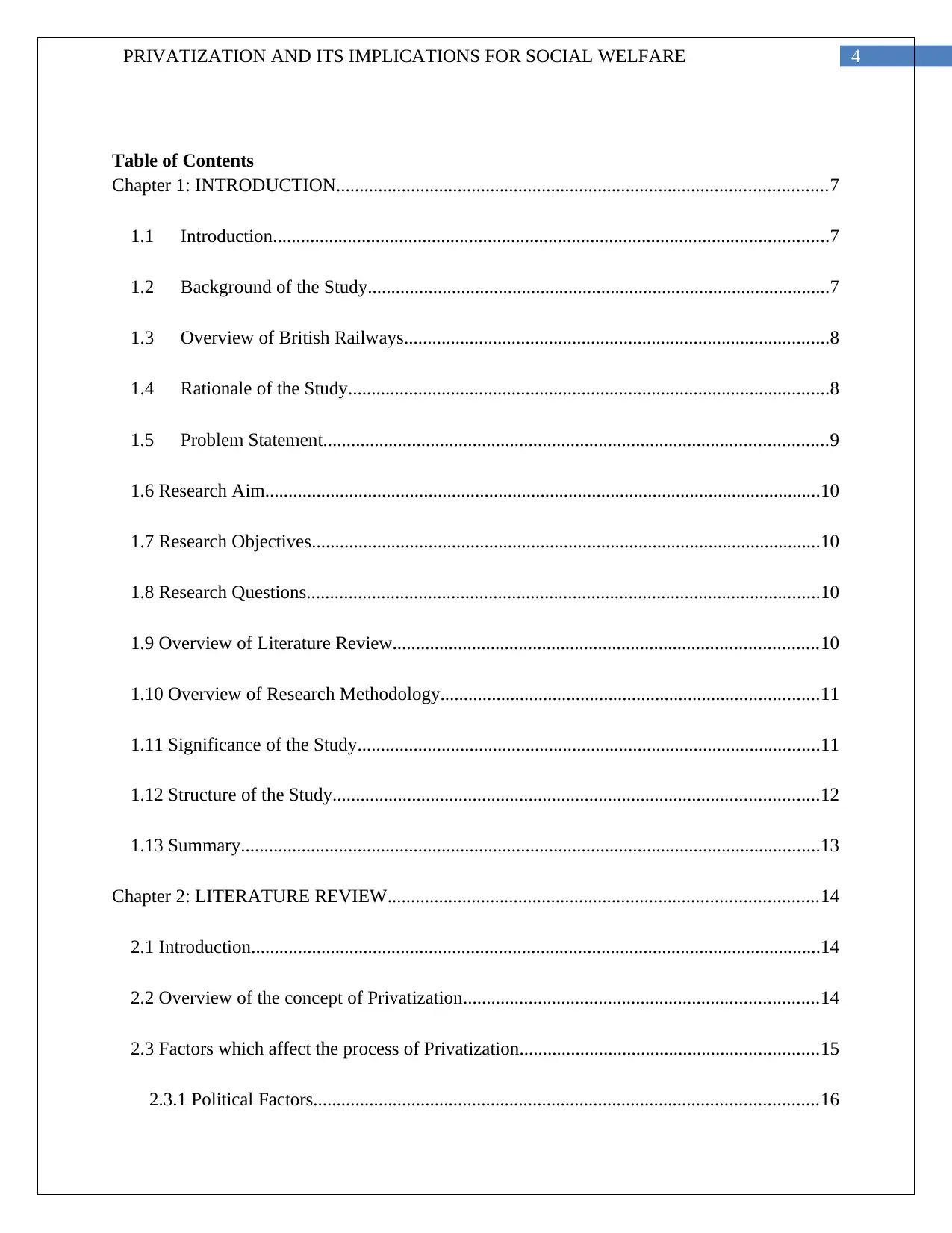
4PRIVATIZATION AND ITS IMPLICATIONS FOR SOCIAL WELFARE
Table of Contents
Chapter 1: INTRODUCTION.........................................................................................................7
1.1 Introduction.......................................................................................................................7
1.2 Background of the Study...................................................................................................7
1.3 Overview of British Railways...........................................................................................8
1.4 Rationale of the Study.......................................................................................................8
1.5 Problem Statement............................................................................................................9
1.6 Research Aim.......................................................................................................................10
1.7 Research Objectives.............................................................................................................10
1.8 Research Questions..............................................................................................................10
1.9 Overview of Literature Review...........................................................................................10
1.10 Overview of Research Methodology.................................................................................11
1.11 Significance of the Study...................................................................................................11
1.12 Structure of the Study........................................................................................................12
1.13 Summary............................................................................................................................13
Chapter 2: LITERATURE REVIEW............................................................................................14
2.1 Introduction..........................................................................................................................14
2.2 Overview of the concept of Privatization............................................................................14
2.3 Factors which affect the process of Privatization................................................................15
2.3.1 Political Factors............................................................................................................16
Table of Contents
Chapter 1: INTRODUCTION.........................................................................................................7
1.1 Introduction.......................................................................................................................7
1.2 Background of the Study...................................................................................................7
1.3 Overview of British Railways...........................................................................................8
1.4 Rationale of the Study.......................................................................................................8
1.5 Problem Statement............................................................................................................9
1.6 Research Aim.......................................................................................................................10
1.7 Research Objectives.............................................................................................................10
1.8 Research Questions..............................................................................................................10
1.9 Overview of Literature Review...........................................................................................10
1.10 Overview of Research Methodology.................................................................................11
1.11 Significance of the Study...................................................................................................11
1.12 Structure of the Study........................................................................................................12
1.13 Summary............................................................................................................................13
Chapter 2: LITERATURE REVIEW............................................................................................14
2.1 Introduction..........................................................................................................................14
2.2 Overview of the concept of Privatization............................................................................14
2.3 Factors which affect the process of Privatization................................................................15
2.3.1 Political Factors............................................................................................................16
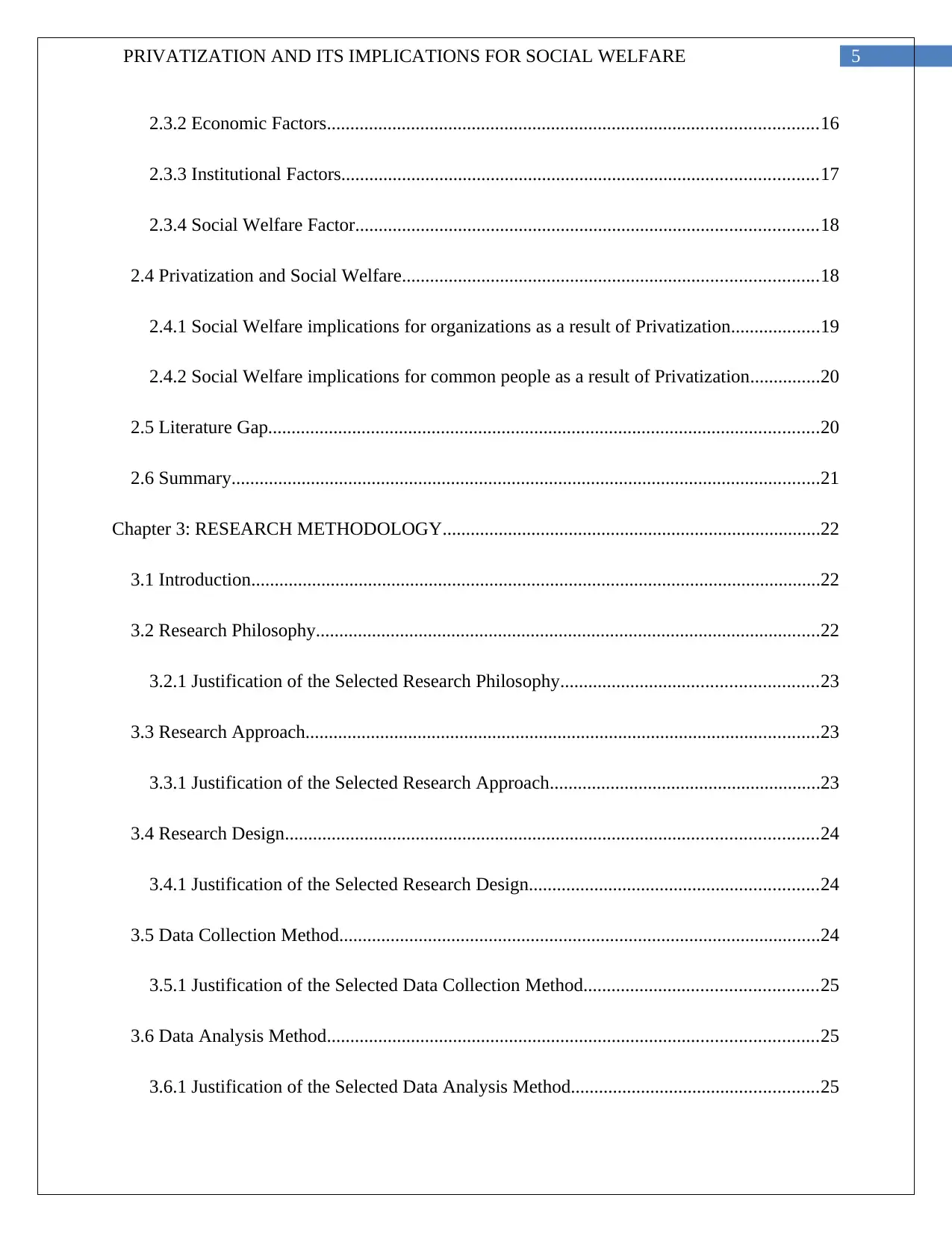
5PRIVATIZATION AND ITS IMPLICATIONS FOR SOCIAL WELFARE
2.3.2 Economic Factors.........................................................................................................16
2.3.3 Institutional Factors......................................................................................................17
2.3.4 Social Welfare Factor...................................................................................................18
2.4 Privatization and Social Welfare.........................................................................................18
2.4.1 Social Welfare implications for organizations as a result of Privatization...................19
2.4.2 Social Welfare implications for common people as a result of Privatization...............20
2.5 Literature Gap......................................................................................................................20
2.6 Summary..............................................................................................................................21
Chapter 3: RESEARCH METHODOLOGY.................................................................................22
3.1 Introduction..........................................................................................................................22
3.2 Research Philosophy............................................................................................................22
3.2.1 Justification of the Selected Research Philosophy.......................................................23
3.3 Research Approach..............................................................................................................23
3.3.1 Justification of the Selected Research Approach..........................................................23
3.4 Research Design..................................................................................................................24
3.4.1 Justification of the Selected Research Design..............................................................24
3.5 Data Collection Method.......................................................................................................24
3.5.1 Justification of the Selected Data Collection Method..................................................25
3.6 Data Analysis Method.........................................................................................................25
3.6.1 Justification of the Selected Data Analysis Method.....................................................25
2.3.2 Economic Factors.........................................................................................................16
2.3.3 Institutional Factors......................................................................................................17
2.3.4 Social Welfare Factor...................................................................................................18
2.4 Privatization and Social Welfare.........................................................................................18
2.4.1 Social Welfare implications for organizations as a result of Privatization...................19
2.4.2 Social Welfare implications for common people as a result of Privatization...............20
2.5 Literature Gap......................................................................................................................20
2.6 Summary..............................................................................................................................21
Chapter 3: RESEARCH METHODOLOGY.................................................................................22
3.1 Introduction..........................................................................................................................22
3.2 Research Philosophy............................................................................................................22
3.2.1 Justification of the Selected Research Philosophy.......................................................23
3.3 Research Approach..............................................................................................................23
3.3.1 Justification of the Selected Research Approach..........................................................23
3.4 Research Design..................................................................................................................24
3.4.1 Justification of the Selected Research Design..............................................................24
3.5 Data Collection Method.......................................................................................................24
3.5.1 Justification of the Selected Data Collection Method..................................................25
3.6 Data Analysis Method.........................................................................................................25
3.6.1 Justification of the Selected Data Analysis Method.....................................................25
⊘ This is a preview!⊘
Do you want full access?
Subscribe today to unlock all pages.

Trusted by 1+ million students worldwide
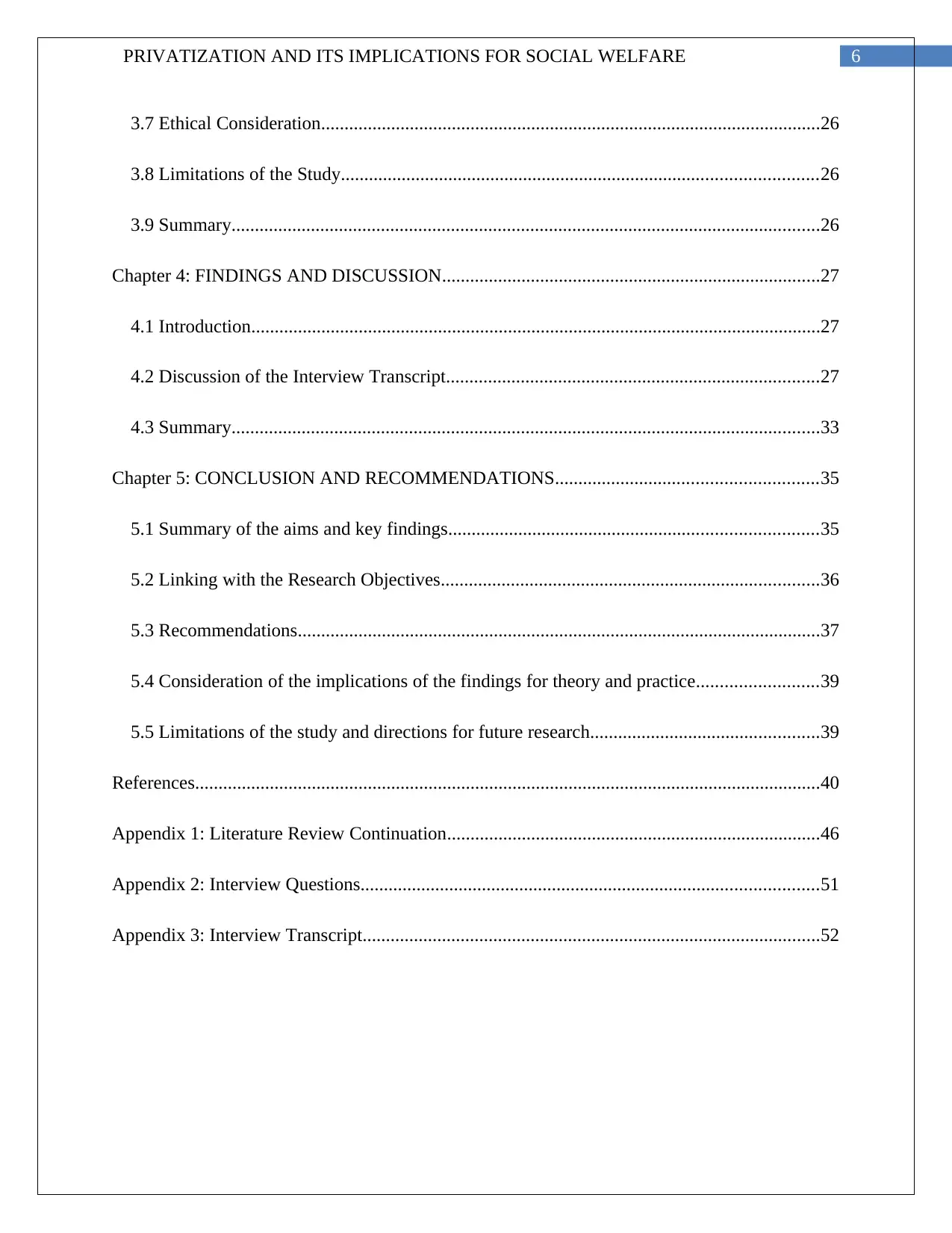
6PRIVATIZATION AND ITS IMPLICATIONS FOR SOCIAL WELFARE
3.7 Ethical Consideration...........................................................................................................26
3.8 Limitations of the Study......................................................................................................26
3.9 Summary..............................................................................................................................26
Chapter 4: FINDINGS AND DISCUSSION.................................................................................27
4.1 Introduction..........................................................................................................................27
4.2 Discussion of the Interview Transcript................................................................................27
4.3 Summary..............................................................................................................................33
Chapter 5: CONCLUSION AND RECOMMENDATIONS........................................................35
5.1 Summary of the aims and key findings...............................................................................35
5.2 Linking with the Research Objectives.................................................................................36
5.3 Recommendations................................................................................................................37
5.4 Consideration of the implications of the findings for theory and practice..........................39
5.5 Limitations of the study and directions for future research.................................................39
References......................................................................................................................................40
Appendix 1: Literature Review Continuation................................................................................46
Appendix 2: Interview Questions..................................................................................................51
Appendix 3: Interview Transcript..................................................................................................52
3.7 Ethical Consideration...........................................................................................................26
3.8 Limitations of the Study......................................................................................................26
3.9 Summary..............................................................................................................................26
Chapter 4: FINDINGS AND DISCUSSION.................................................................................27
4.1 Introduction..........................................................................................................................27
4.2 Discussion of the Interview Transcript................................................................................27
4.3 Summary..............................................................................................................................33
Chapter 5: CONCLUSION AND RECOMMENDATIONS........................................................35
5.1 Summary of the aims and key findings...............................................................................35
5.2 Linking with the Research Objectives.................................................................................36
5.3 Recommendations................................................................................................................37
5.4 Consideration of the implications of the findings for theory and practice..........................39
5.5 Limitations of the study and directions for future research.................................................39
References......................................................................................................................................40
Appendix 1: Literature Review Continuation................................................................................46
Appendix 2: Interview Questions..................................................................................................51
Appendix 3: Interview Transcript..................................................................................................52
Paraphrase This Document
Need a fresh take? Get an instant paraphrase of this document with our AI Paraphraser
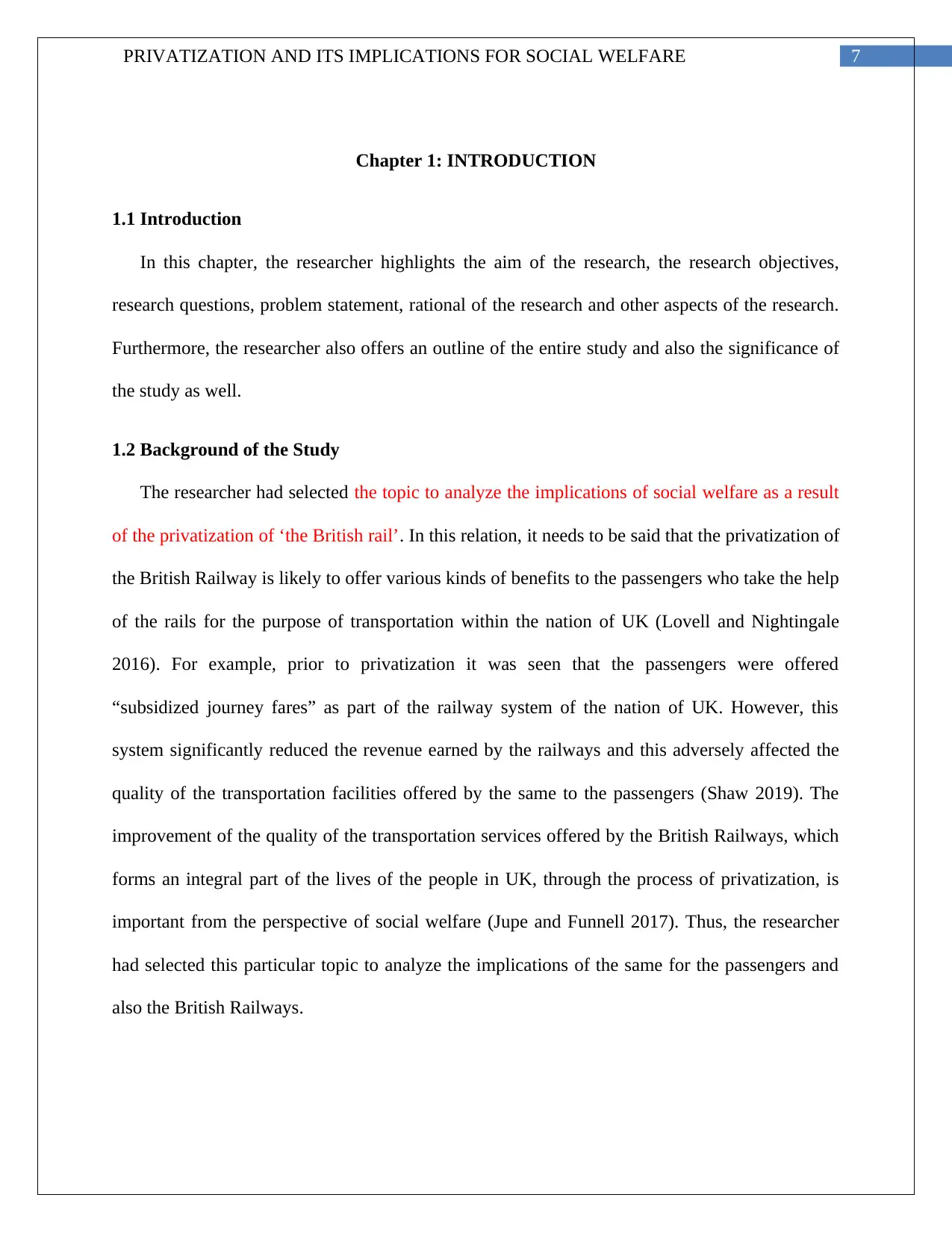
7PRIVATIZATION AND ITS IMPLICATIONS FOR SOCIAL WELFARE
Chapter 1: INTRODUCTION
1.1 Introduction
In this chapter, the researcher highlights the aim of the research, the research objectives,
research questions, problem statement, rational of the research and other aspects of the research.
Furthermore, the researcher also offers an outline of the entire study and also the significance of
the study as well.
1.2 Background of the Study
The researcher had selected the topic to analyze the implications of social welfare as a result
of the privatization of ‘the British rail’. In this relation, it needs to be said that the privatization of
the British Railway is likely to offer various kinds of benefits to the passengers who take the help
of the rails for the purpose of transportation within the nation of UK (Lovell and Nightingale
2016). For example, prior to privatization it was seen that the passengers were offered
“subsidized journey fares” as part of the railway system of the nation of UK. However, this
system significantly reduced the revenue earned by the railways and this adversely affected the
quality of the transportation facilities offered by the same to the passengers (Shaw 2019). The
improvement of the quality of the transportation services offered by the British Railways, which
forms an integral part of the lives of the people in UK, through the process of privatization, is
important from the perspective of social welfare (Jupe and Funnell 2017). Thus, the researcher
had selected this particular topic to analyze the implications of the same for the passengers and
also the British Railways.
Chapter 1: INTRODUCTION
1.1 Introduction
In this chapter, the researcher highlights the aim of the research, the research objectives,
research questions, problem statement, rational of the research and other aspects of the research.
Furthermore, the researcher also offers an outline of the entire study and also the significance of
the study as well.
1.2 Background of the Study
The researcher had selected the topic to analyze the implications of social welfare as a result
of the privatization of ‘the British rail’. In this relation, it needs to be said that the privatization of
the British Railway is likely to offer various kinds of benefits to the passengers who take the help
of the rails for the purpose of transportation within the nation of UK (Lovell and Nightingale
2016). For example, prior to privatization it was seen that the passengers were offered
“subsidized journey fares” as part of the railway system of the nation of UK. However, this
system significantly reduced the revenue earned by the railways and this adversely affected the
quality of the transportation facilities offered by the same to the passengers (Shaw 2019). The
improvement of the quality of the transportation services offered by the British Railways, which
forms an integral part of the lives of the people in UK, through the process of privatization, is
important from the perspective of social welfare (Jupe and Funnell 2017). Thus, the researcher
had selected this particular topic to analyze the implications of the same for the passengers and
also the British Railways.
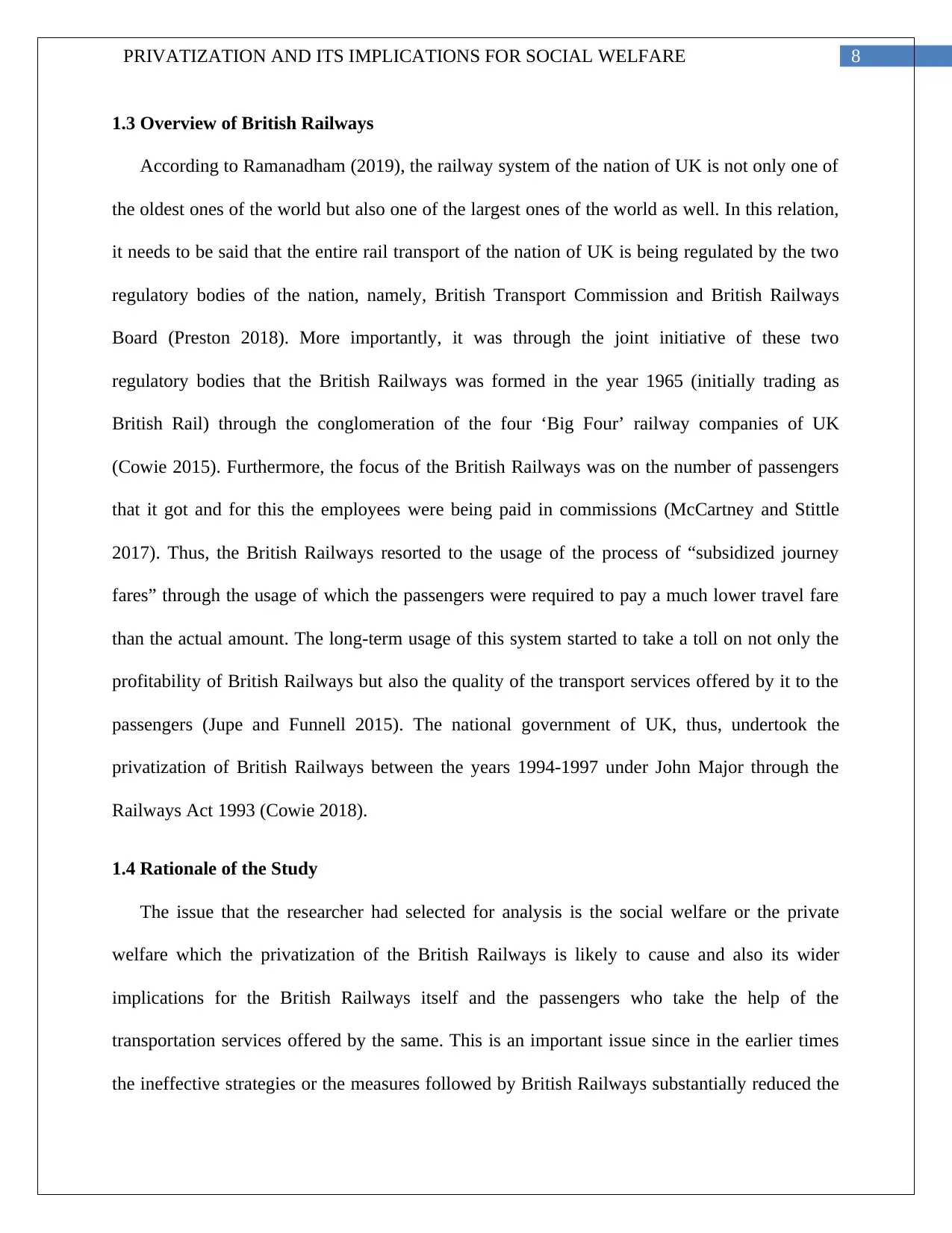
8PRIVATIZATION AND ITS IMPLICATIONS FOR SOCIAL WELFARE
1.3 Overview of British Railways
According to Ramanadham (2019), the railway system of the nation of UK is not only one of
the oldest ones of the world but also one of the largest ones of the world as well. In this relation,
it needs to be said that the entire rail transport of the nation of UK is being regulated by the two
regulatory bodies of the nation, namely, British Transport Commission and British Railways
Board (Preston 2018). More importantly, it was through the joint initiative of these two
regulatory bodies that the British Railways was formed in the year 1965 (initially trading as
British Rail) through the conglomeration of the four ‘Big Four’ railway companies of UK
(Cowie 2015). Furthermore, the focus of the British Railways was on the number of passengers
that it got and for this the employees were being paid in commissions (McCartney and Stittle
2017). Thus, the British Railways resorted to the usage of the process of “subsidized journey
fares” through the usage of which the passengers were required to pay a much lower travel fare
than the actual amount. The long-term usage of this system started to take a toll on not only the
profitability of British Railways but also the quality of the transport services offered by it to the
passengers (Jupe and Funnell 2015). The national government of UK, thus, undertook the
privatization of British Railways between the years 1994-1997 under John Major through the
Railways Act 1993 (Cowie 2018).
1.4 Rationale of the Study
The issue that the researcher had selected for analysis is the social welfare or the private
welfare which the privatization of the British Railways is likely to cause and also its wider
implications for the British Railways itself and the passengers who take the help of the
transportation services offered by the same. This is an important issue since in the earlier times
the ineffective strategies or the measures followed by British Railways substantially reduced the
1.3 Overview of British Railways
According to Ramanadham (2019), the railway system of the nation of UK is not only one of
the oldest ones of the world but also one of the largest ones of the world as well. In this relation,
it needs to be said that the entire rail transport of the nation of UK is being regulated by the two
regulatory bodies of the nation, namely, British Transport Commission and British Railways
Board (Preston 2018). More importantly, it was through the joint initiative of these two
regulatory bodies that the British Railways was formed in the year 1965 (initially trading as
British Rail) through the conglomeration of the four ‘Big Four’ railway companies of UK
(Cowie 2015). Furthermore, the focus of the British Railways was on the number of passengers
that it got and for this the employees were being paid in commissions (McCartney and Stittle
2017). Thus, the British Railways resorted to the usage of the process of “subsidized journey
fares” through the usage of which the passengers were required to pay a much lower travel fare
than the actual amount. The long-term usage of this system started to take a toll on not only the
profitability of British Railways but also the quality of the transport services offered by it to the
passengers (Jupe and Funnell 2015). The national government of UK, thus, undertook the
privatization of British Railways between the years 1994-1997 under John Major through the
Railways Act 1993 (Cowie 2018).
1.4 Rationale of the Study
The issue that the researcher had selected for analysis is the social welfare or the private
welfare which the privatization of the British Railways is likely to cause and also its wider
implications for the British Railways itself and the passengers who take the help of the
transportation services offered by the same. This is an important issue since in the earlier times
the ineffective strategies or the measures followed by British Railways substantially reduced the
⊘ This is a preview!⊘
Do you want full access?
Subscribe today to unlock all pages.

Trusted by 1+ million students worldwide
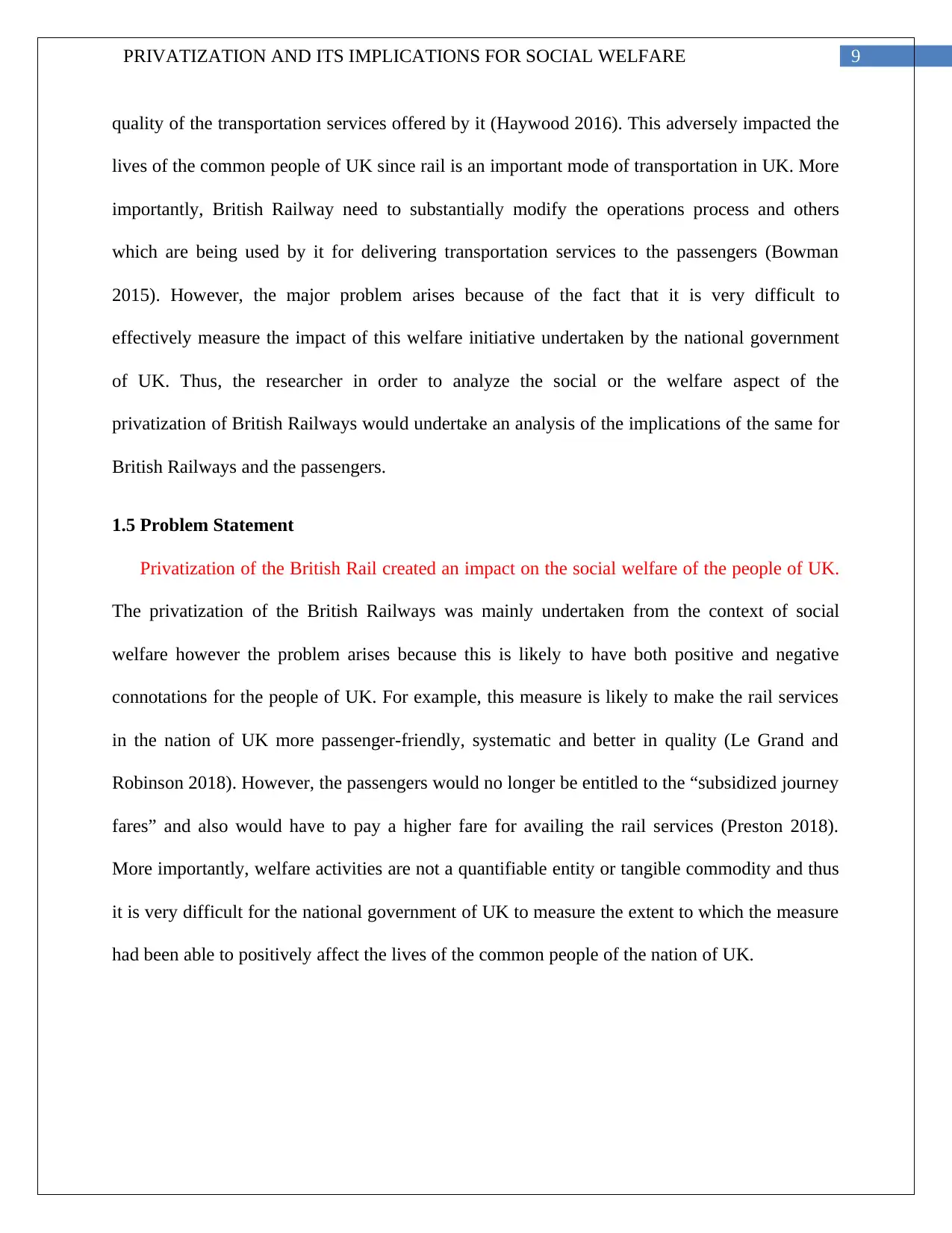
9PRIVATIZATION AND ITS IMPLICATIONS FOR SOCIAL WELFARE
quality of the transportation services offered by it (Haywood 2016). This adversely impacted the
lives of the common people of UK since rail is an important mode of transportation in UK. More
importantly, British Railway need to substantially modify the operations process and others
which are being used by it for delivering transportation services to the passengers (Bowman
2015). However, the major problem arises because of the fact that it is very difficult to
effectively measure the impact of this welfare initiative undertaken by the national government
of UK. Thus, the researcher in order to analyze the social or the welfare aspect of the
privatization of British Railways would undertake an analysis of the implications of the same for
British Railways and the passengers.
1.5 Problem Statement
Privatization of the British Rail created an impact on the social welfare of the people of UK.
The privatization of the British Railways was mainly undertaken from the context of social
welfare however the problem arises because this is likely to have both positive and negative
connotations for the people of UK. For example, this measure is likely to make the rail services
in the nation of UK more passenger-friendly, systematic and better in quality (Le Grand and
Robinson 2018). However, the passengers would no longer be entitled to the “subsidized journey
fares” and also would have to pay a higher fare for availing the rail services (Preston 2018).
More importantly, welfare activities are not a quantifiable entity or tangible commodity and thus
it is very difficult for the national government of UK to measure the extent to which the measure
had been able to positively affect the lives of the common people of the nation of UK.
quality of the transportation services offered by it (Haywood 2016). This adversely impacted the
lives of the common people of UK since rail is an important mode of transportation in UK. More
importantly, British Railway need to substantially modify the operations process and others
which are being used by it for delivering transportation services to the passengers (Bowman
2015). However, the major problem arises because of the fact that it is very difficult to
effectively measure the impact of this welfare initiative undertaken by the national government
of UK. Thus, the researcher in order to analyze the social or the welfare aspect of the
privatization of British Railways would undertake an analysis of the implications of the same for
British Railways and the passengers.
1.5 Problem Statement
Privatization of the British Rail created an impact on the social welfare of the people of UK.
The privatization of the British Railways was mainly undertaken from the context of social
welfare however the problem arises because this is likely to have both positive and negative
connotations for the people of UK. For example, this measure is likely to make the rail services
in the nation of UK more passenger-friendly, systematic and better in quality (Le Grand and
Robinson 2018). However, the passengers would no longer be entitled to the “subsidized journey
fares” and also would have to pay a higher fare for availing the rail services (Preston 2018).
More importantly, welfare activities are not a quantifiable entity or tangible commodity and thus
it is very difficult for the national government of UK to measure the extent to which the measure
had been able to positively affect the lives of the common people of the nation of UK.
Paraphrase This Document
Need a fresh take? Get an instant paraphrase of this document with our AI Paraphraser
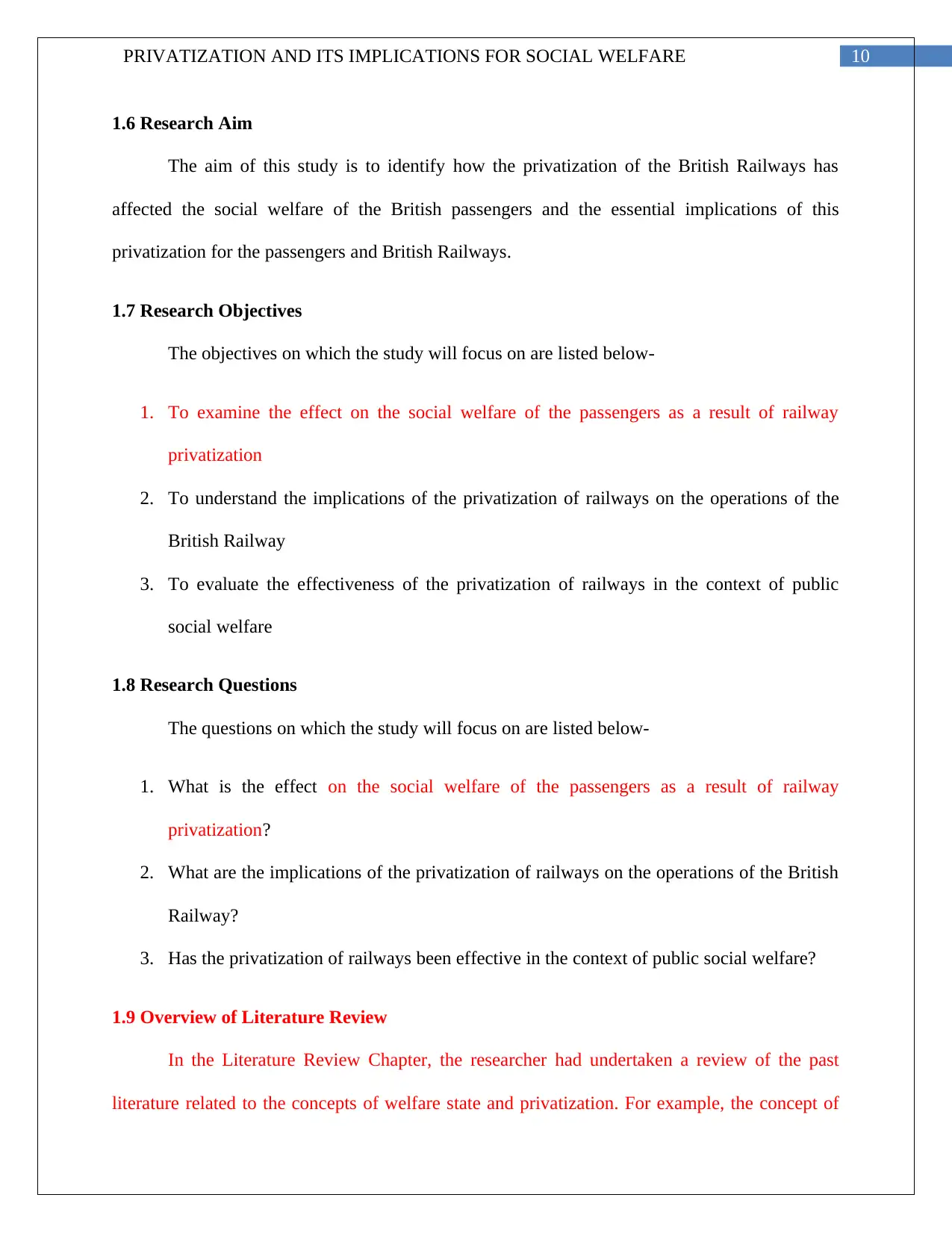
10PRIVATIZATION AND ITS IMPLICATIONS FOR SOCIAL WELFARE
1.6 Research Aim
The aim of this study is to identify how the privatization of the British Railways has
affected the social welfare of the British passengers and the essential implications of this
privatization for the passengers and British Railways.
1.7 Research Objectives
The objectives on which the study will focus on are listed below-
1. To examine the effect on the social welfare of the passengers as a result of railway
privatization
2. To understand the implications of the privatization of railways on the operations of the
British Railway
3. To evaluate the effectiveness of the privatization of railways in the context of public
social welfare
1.8 Research Questions
The questions on which the study will focus on are listed below-
1. What is the effect on the social welfare of the passengers as a result of railway
privatization?
2. What are the implications of the privatization of railways on the operations of the British
Railway?
3. Has the privatization of railways been effective in the context of public social welfare?
1.9 Overview of Literature Review
In the Literature Review Chapter, the researcher had undertaken a review of the past
literature related to the concepts of welfare state and privatization. For example, the concept of
1.6 Research Aim
The aim of this study is to identify how the privatization of the British Railways has
affected the social welfare of the British passengers and the essential implications of this
privatization for the passengers and British Railways.
1.7 Research Objectives
The objectives on which the study will focus on are listed below-
1. To examine the effect on the social welfare of the passengers as a result of railway
privatization
2. To understand the implications of the privatization of railways on the operations of the
British Railway
3. To evaluate the effectiveness of the privatization of railways in the context of public
social welfare
1.8 Research Questions
The questions on which the study will focus on are listed below-
1. What is the effect on the social welfare of the passengers as a result of railway
privatization?
2. What are the implications of the privatization of railways on the operations of the British
Railway?
3. Has the privatization of railways been effective in the context of public social welfare?
1.9 Overview of Literature Review
In the Literature Review Chapter, the researcher had undertaken a review of the past
literature related to the concepts of welfare state and privatization. For example, the concept of
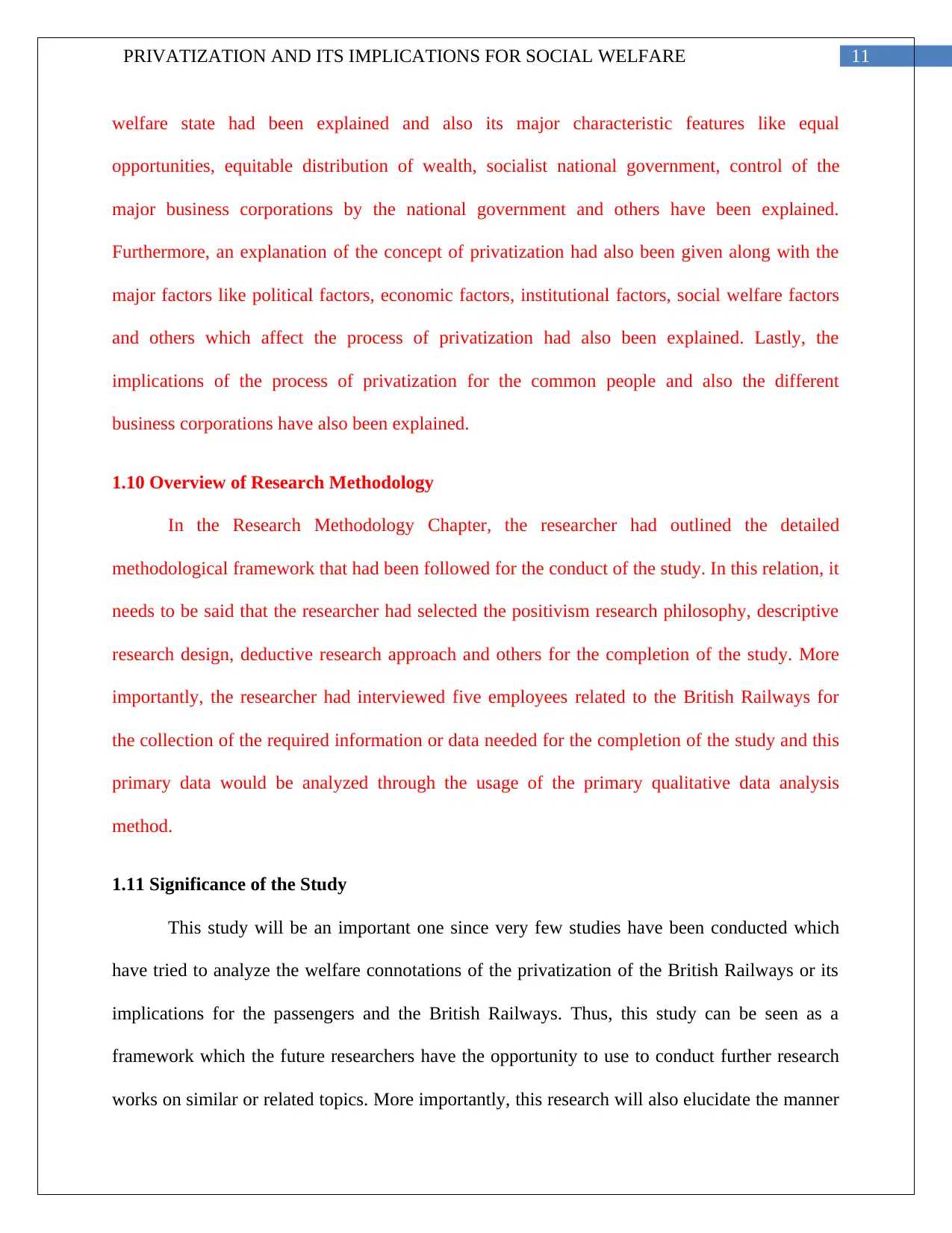
11PRIVATIZATION AND ITS IMPLICATIONS FOR SOCIAL WELFARE
welfare state had been explained and also its major characteristic features like equal
opportunities, equitable distribution of wealth, socialist national government, control of the
major business corporations by the national government and others have been explained.
Furthermore, an explanation of the concept of privatization had also been given along with the
major factors like political factors, economic factors, institutional factors, social welfare factors
and others which affect the process of privatization had also been explained. Lastly, the
implications of the process of privatization for the common people and also the different
business corporations have also been explained.
1.10 Overview of Research Methodology
In the Research Methodology Chapter, the researcher had outlined the detailed
methodological framework that had been followed for the conduct of the study. In this relation, it
needs to be said that the researcher had selected the positivism research philosophy, descriptive
research design, deductive research approach and others for the completion of the study. More
importantly, the researcher had interviewed five employees related to the British Railways for
the collection of the required information or data needed for the completion of the study and this
primary data would be analyzed through the usage of the primary qualitative data analysis
method.
1.11 Significance of the Study
This study will be an important one since very few studies have been conducted which
have tried to analyze the welfare connotations of the privatization of the British Railways or its
implications for the passengers and the British Railways. Thus, this study can be seen as a
framework which the future researchers have the opportunity to use to conduct further research
works on similar or related topics. More importantly, this research will also elucidate the manner
welfare state had been explained and also its major characteristic features like equal
opportunities, equitable distribution of wealth, socialist national government, control of the
major business corporations by the national government and others have been explained.
Furthermore, an explanation of the concept of privatization had also been given along with the
major factors like political factors, economic factors, institutional factors, social welfare factors
and others which affect the process of privatization had also been explained. Lastly, the
implications of the process of privatization for the common people and also the different
business corporations have also been explained.
1.10 Overview of Research Methodology
In the Research Methodology Chapter, the researcher had outlined the detailed
methodological framework that had been followed for the conduct of the study. In this relation, it
needs to be said that the researcher had selected the positivism research philosophy, descriptive
research design, deductive research approach and others for the completion of the study. More
importantly, the researcher had interviewed five employees related to the British Railways for
the collection of the required information or data needed for the completion of the study and this
primary data would be analyzed through the usage of the primary qualitative data analysis
method.
1.11 Significance of the Study
This study will be an important one since very few studies have been conducted which
have tried to analyze the welfare connotations of the privatization of the British Railways or its
implications for the passengers and the British Railways. Thus, this study can be seen as a
framework which the future researchers have the opportunity to use to conduct further research
works on similar or related topics. More importantly, this research will also elucidate the manner
⊘ This is a preview!⊘
Do you want full access?
Subscribe today to unlock all pages.

Trusted by 1+ million students worldwide
1 out of 60
Related Documents
Your All-in-One AI-Powered Toolkit for Academic Success.
+13062052269
info@desklib.com
Available 24*7 on WhatsApp / Email
![[object Object]](/_next/static/media/star-bottom.7253800d.svg)
Unlock your academic potential
Copyright © 2020–2025 A2Z Services. All Rights Reserved. Developed and managed by ZUCOL.





